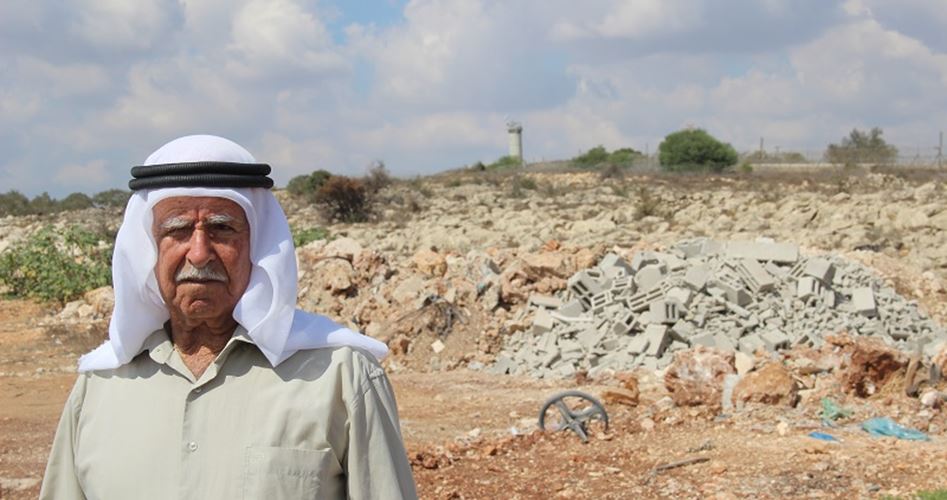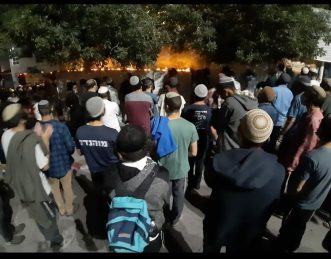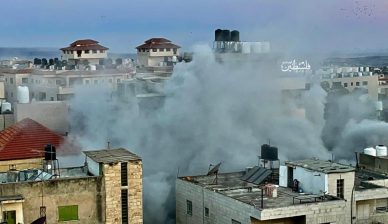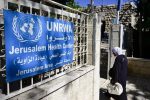His eyes roam far to his land behind the Apartheid Wall north of Salfit sometimes he could not hold his tears back and sometimes he manages to control them. As he puts it missing his land is like ‘a burning fire’ as the scene of the olive harvest which the Israeli occupation authorities made it impossible to happen is still alive in his memory.
The Separation Wall has robbed farmer Ahmad al-Damas 82 from the town of Salfit more than 60 dunums of his family’s land in the areas of Wadi Al-Rahman Wadi Hiyaj and the Sanabel to the north of the governorate of Salfit. He said “I do not know what the Israeli occupation forces are doing with my land as we are not allowed to access it except for a few days during the year. During the olive harvest season they allow us to harvest olives for a limited period of time during the day without paying attention to our conditions.”
“We used to go to our fields early in the morning when birds would start singing. We would sing our traditional songs. The spirit of cooperation was better than it is now and our days were better and more beautiful and all were happy” he added recalling those beautiful days of picking olives before building the Separation Wall. After taking a deep breath he continued: “The occupation turned everything upside down and our joy and happiness turned into misery and humiliation and inspection at the occupation’s gates.”

Olive celebrations
He pointed out that in the past the olive season was a pure national event: “We used to sleep at our land and lived in security safety and prosperity. But now we live in poverty and humiliation at the gates of the occupation’s wall. It is forbidden to enter and exit without permits. So that we don’t know what happens to our land throughout the year except during the olive season when they allow us to enter our land.”
He adds “Now the olive harvest season is taking place starting by harvesting the Sarees olives then the rest of types of olives. It is true that we do not know when we would be permitted to enter our land again but we will continue to challenge the occupation clinging to our land despite the arrogance of the occupation.”
He asserts “The land means everything to us: Life good livelihood future homeland dignity and pride and all the punitive measures of occupation will not deter us from preserving our land and we will die on it with our heads held high and we will follow the steps of our ancestors who spilled their blood for it.”
In the opinion of Abu Maazouz the olive tree represents a battle of identity with the occupation explaining: “Every time the olive harvest season is due the occupation and its settlers feel irritated and they become very dangerous acting like stray dogs and trying all possible means to spoil this season and to terrorize the Palestinians in all possible ways to prevent them from reaching out to their orchards and vineyards to harvest their crops.”
“The occupation also tried to rob olive trees and to present them to the world through propaganda to promote tourism by placing them on postage stamps as a symbol of its history and heritage” he continued. But this does not weaken the Palestinian strength or determination and challenge adding “We Palestinians affirm that this is our history and our roots and our olives a witness to our truth and identity” according to Abu Maazouz.
Settlement expansion
Ghassan Daghlas the head of the settlement file in the northern West Bank said that the land behind the wall whether in Salfit or the rest of the West Bank suffered heavy losses during the olive season due to the short time during which farmers are allowed to pick olives and due to land confiscation and uprooting and the settlers’ assaults on fields and farmers.
On the legality of what the occupation does during the olive season researcher Khaled Ma’ali says that the Israeli occupation’s measures and the restrictions imposed by its soldiers on farmers behind the wall violate the international humanitarian law and the occupation should not according to the international law disrupt the olive season and harass farmers as it constitutes a violation of the civilian population’s work as stipulated in Article 52 of the Fourth Geneva Convention.
He pointed out that the villages and towns of Salfit as well as the rest of Palestine’s governorates suffer during the olive season from the Israeli occupation and its violations aimed at expelling and displacing farmers to allow Israeli settlers to expand their settlements.

















